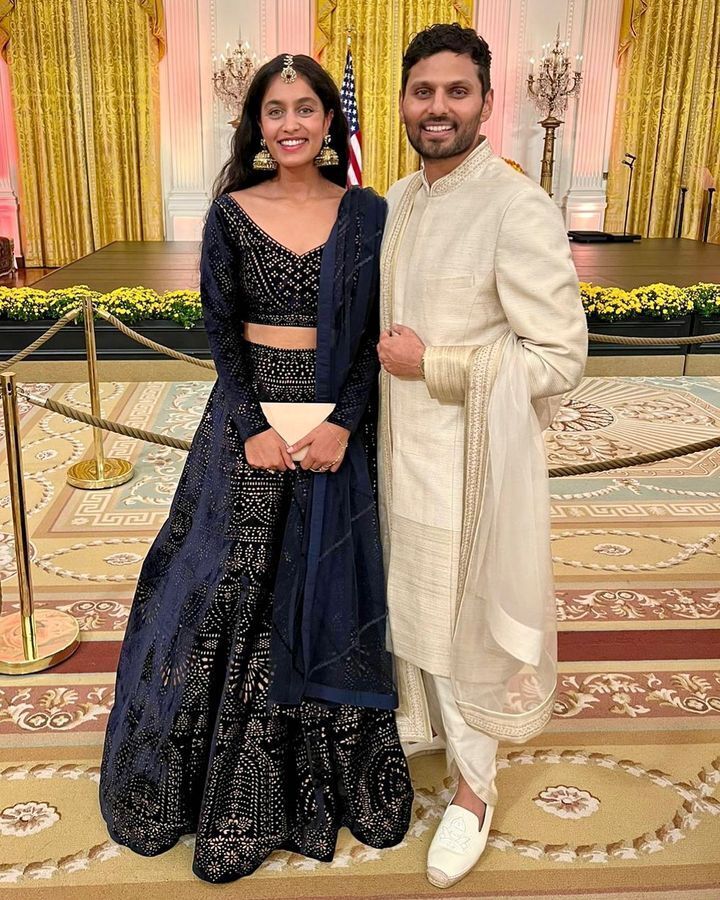How to Practice Love, According to Monk Jay Shetty

In a society where grand gestures are applauded and sometimes expected–as evidenced across pop culture and fairy tales–bestselling author of Think Like a Monk and the 8 Rules of Love, Jay Shetty, argues the opposite: by practicing and nurturing love consistently, we experience it profoundly. "We often focus on all of the love we don't feel we're getting, rather than the love we could be giving," Shetty tells The Knot. "The beautiful thing about love is: whether you're receiving it or giving it, you're still experiencing it." Read his love notes and reflections, including practical tips for helping couples find their purpose.
In this article:
Jay Shetty's Love Notes & Reflections
In Think Like a Monk, Shetty devotes a chapter to romantic relationships, humbly reflecting on his own storybook notions of love when he was dating his now-wife, Radhi Devlukia-Shetty. Love has been a perennial topic of interest on Shetty's podcast, On Purpose, so highly requested, in fact, that it influenced the direction of his second book, The 8 Rules of Love.
"Nobody sits us down and teaches us how to love," he writes in the introduction of his new book. "…Love is not about staging the perfect proposal or creating a perfect relationship. It's about learning to navigate the imperfections that are intrinsic to ourselves, our partners, and life itself." Here are some tips from Shetty for ways to grow in love.
Embrace Action Yourself
Rather than the wait-and-see approach, expressing love first is one way to grow in the practice. "If you want to feel more connection, you don't have to wait for someone to give it to you," Shetty tells The Knot. "You can choose to connect."
Lean Into Service, First
In Think Like a Monk, Shetty argues the road to happiness is found through serving others and serving a greater purpose. The same applies to love. "One of the easiest ways to [connect], and to show love for others, is through service," he says. "We can serve our partner, our families, our friends, our communities. We can serve animals and the environment. The options are endless. So, instead of expecting love, we can find ways of expressing love."
Focus On Each Other (Especially When Wedding Planning)
The shuffle of RSVPs, budgeting and navigating the complicated world of seating arrangements amid acrimonious relationships can be challenging, but it's far from the end goal. Wedding planning is a time to build your relationship with your partner. "I encourage couples to remember what's most important," Shetty says. "With all the pressure to have a perfect wedding, it's really easy to get caught up in details and lose sight of why you're getting married in the first place. Yes, you want your day to be special, but as much as possible you also want to enjoy the process of planning it, so as you're doing that, try to set aside some opportunities to just enjoy each other. And, you want to make sure you're not just planning a memorable wedding, but a successful marriage. So, throughout your engagement, carve out time when you're not talking about menus or venues, but instead you're discussing your vision for your relationship."
Appreciate Those Who Surround You With Love
Another way to build a connection is to acknowledge those who champion your relationship. "There were so many amazing aspects of our wedding day," Shetty reflects. "We had a traditional Indian wedding with all of our family members. I remember how I felt when we made our vows, everyone was just so present with us and so supportive. I remember feeling surrounded by so much love."
Evolve Together
Challenging your partner to pursue their highest self is another form of bonding (more on that below), something Shetty appreciates about his wife. "My favorite part of our marriage is how Radhi and I both continue to grow and change. We're trying new things, we're learning, and making mistakes. We're doing it all together," says Shetty. "As much as I know Radhi, she's also always surprising me, and hopefully I'm surprising her. I feel really comfortable with her and I also feel challenged—in a good way. It's a great balance."
How to Help Your Partner Pursue Their Purpose
Finding one's destiny is perhaps one of the greatest quests sought by humanity. But in a society fascinated by productivity and influence (inspiring mimetic behavior and notions of what one "should become"), it's easy to inflict your own agenda on others, especially upon a significant other. What if, Shetty poses, we led with our true calling first and supported our partner in that quest?
"In the Vedic tradition, helping one another fulfill your purpose is seen as an essential component [of] a successful relationship. It's even part of the wedding vows in a Vedic ceremony," says Shetty, who practiced in an ashram in India from 2010 to 2013. "Too often, when we're busy trying to balance everything going on in our lives, it can feel like one person's purpose has to take a backseat to the other's. It can be easy to lose sight of the importance of making room for both partners' dharma. I describe 'dharma' as the intersection of passion, expertise, and service—what you deeply enjoy, are good at, and benefits others or fills a need in the world. Your partner might not have connected with their dharma yet, which you can support them in doing so to help them learn what in life really engages them and lights them up."
Let's say your partner's goals concern you. How do you reconcile their hopes and dreams with your worries? "You might feel anxious or concerned if your partner's vision means that your current way of life will be disrupted. Maybe their goals feel risky, like they want to change careers or move to another city, and you're worried that will affect the household," muses Shetty. "That's totally normal, but at the same time, you don't want to let your fear derail their dreams. Share your concerns, but also let them know that you want to figure out a way to make it work. And when your partner feels supported, and you work together to come up with solutions, it will actually strengthen your relationship."
Even in his personal life, Shetty has committed to this practice. "Radhi and I both promised that we would always support each other in pursuing our purpose," he reveals. "We also agreed to prioritize spending meaningful time together, meditating together, and growing our spiritual practices together. We set an intention in our relationship of wanting to always learn and grow together, and for each of us to keep bringing new things into the relationship."
Action is required. "What we've learned is that it wasn't enough to just agree to these broad ideals, we also needed to come up with specific ways to practice them and when they would happen," he adds. "For example, we set aside one weekend each month for quality time together–no work, no phones."
Listen to Shetty's audiobook version of the goals exercise above.

























